Swimming For Weight Loss + FAQs – By Professional Swimmer Ben Treffers
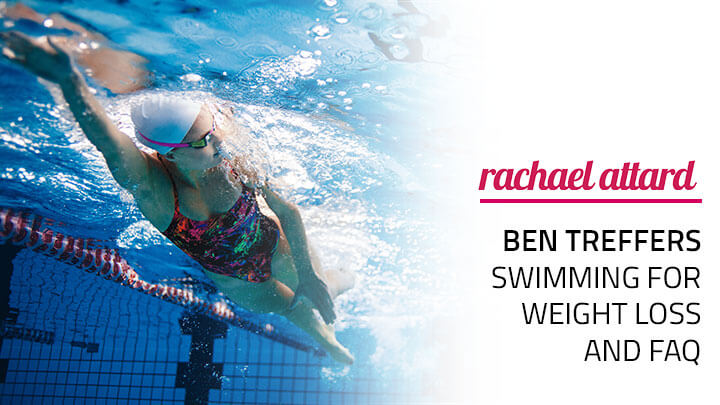
I get asked a lot of questions about swimming from all of you :) Questions such as – is swimming good for weight loss, will it make me bulky, is it a good alternative to running, etc.
So I thought it would be a great idea to ask professional swimmer Ben Treffers his opinion on all of these questions. Ben has also kindly put together a swim training plan for women who want to lose weight, plus he tells us what type of training he does as a professional athlete.
First of all, here is a little bit of info on Ben:
- Name: Ben Treffers
- Age: 26
- Location: Gold Coast
- Instagram: @bentreffers
- Occupation: Full Time Professional Swimmer
- Medals: Commonwealth Games Gold Medalists and World Championships Bronze Medalist in the 50m Backstroke.
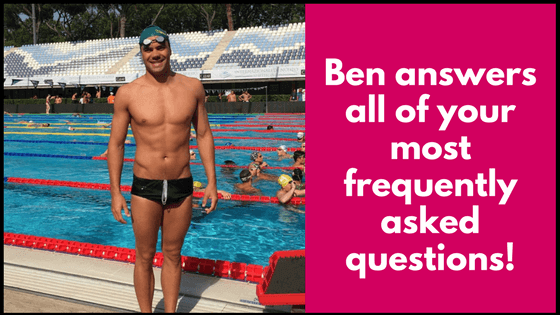
IS SWIMMING A GOOD WORKOUT FOR WOMENT WHO WANT TO LOSE WEIGHT?
I think swimming is a good workout to add variety to your training, plus it’s a great aerobic form of exercise that doesn’t break down muscle and therefore doesn’t result in soreness. It’s a good option to help change things up whilst not taking too much out of you.
However, I wouldn’t suggest swimming as your sole source of aerobic, weight loss exercise. I would use swimming as part of a well planned training program that includes various forms of exercise. Also, swimming can increase your metabolism, so you need to be careful of diet following a swimming session.
WOULD YOU CONSIDER SWIMMING AS CARDIO OR RESISTANCE?
I think it depends on your level of ability and session type. As a professional athlete, I have both types of training.
Cardio training sessions are aerobic based, and consist of swimming about 4km with a heart rate in 120-160 HR zone.
Resistance training sessions are anaerobic based, and focus more on high intensity training. I do these around 3 times per week. An example would be 20 x 50m with 3 hard laps, followed by 2 easy laps.
For the recreational swimmer, most swimming training will be aerobic based, and result in cardio improvements. It is very difficult for recreational swimmers to achieve the level of intensity required to create a resistance training type of reaction in your body’s energy system.
Aerobic swimming will also help to improve other forms of exercise such as running and weight training.
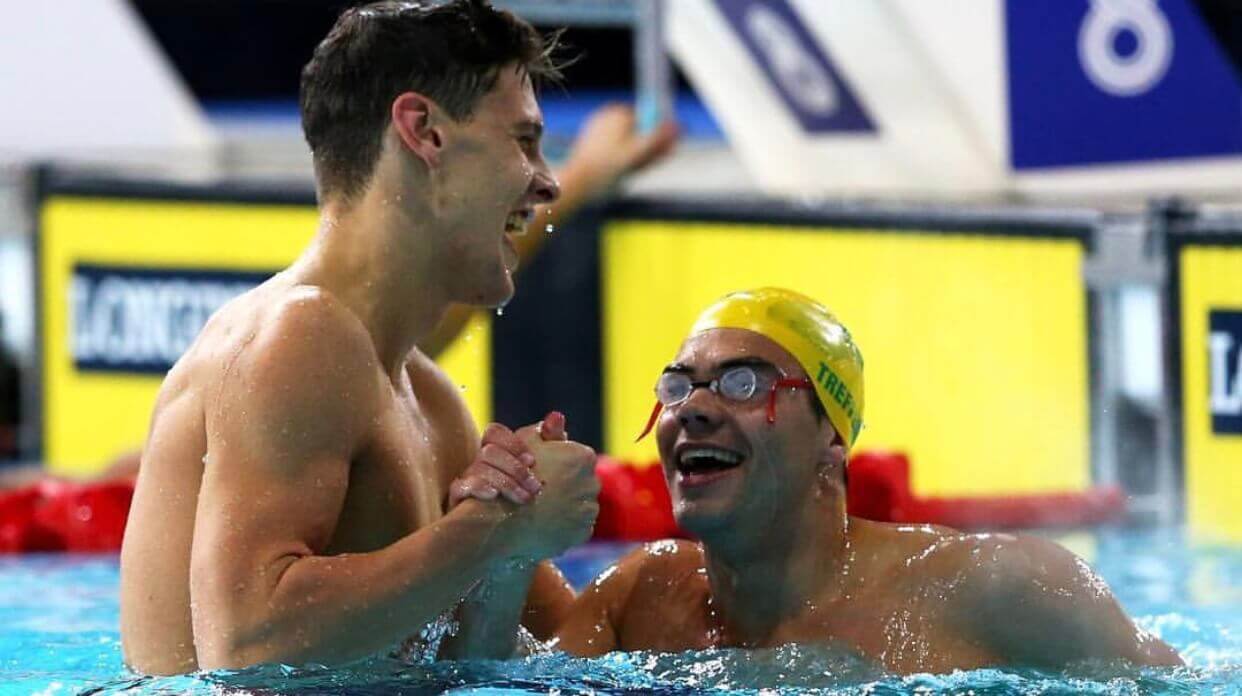
WILL TOO MUCH SWIMMING MAKE A WOMAN BLUKY?
I don’t think too much swimming makes women bulky. There are a lot of female professional swimmers that don’t have bulky upper bodies, and they can be swimming more than 50km per week.
Most of the bulk you sometimes see on female swimmers is due to the combination of their swimming and gym work. And like I said above, swimming is mostly an aerobic exercise, particularly for recreational swimmers.
I think being a professional swimmer, bulky upper bodies is a bi-product of pushing your body to the maximum for your sport in the pool and in the gym, and the amount of training these athletes do is incredible.
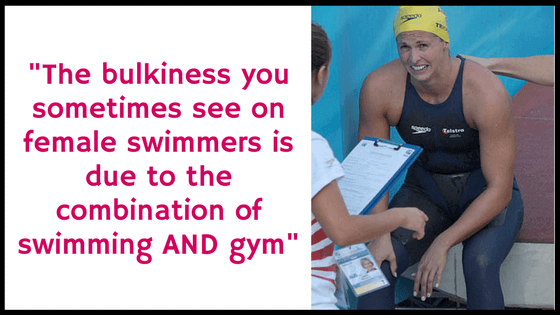
DIET RELATED WEIGHT GAIN IN SWIMMERS
Elite swimmers don’t train at the same level/intensity over the entire year, so time off and not adjusting diet can cause a problem with weight gain. Because swimmers are doing so much training during their preparation, they are able to eat a balanced diet until full each meal and maintain their weight.
But when they are tapering (reducing training prior to racing) or during time off, they can gain weight quickly. In taper it can be particularly difficult, because you want to keep eating the same amount as your metabolism is burning, and you continue training and preparing to race, but you need to be careful not to over eat as the amount of work decreases.
As for time off, athletes can be quite diligent on their diet during their preparation, but with approximately 3 weeks off per year, all the fruit, junk food and alcohol can result in the kilograms piling on. I firmly believe moderation and balance is key to achieve any diet related goal.
IS SWIMMING A GOOD ALTERANTIVE TO RUNNING?
My personal belief is that swimming as a weight loss exercise can be incorporated but has its limitations. Swimming is a great exercise to offer variety to a training program, and can improve lung capacity and upper body strength.
However, as mentioned above, swimming can play havoc on your metabolism, and depending on your ability, you may not get the results you are after. A way to overcome this is by getting some professional coaching, or by adding flippers to help you swim faster.
Unlike swimming, the effects of running are only marginally limited by skill/ability, and the compounding nature of running has a greater impact on weight loss. You also need to take into account that your ability in the pool might affect your returns on swimming as an exercise. So like dieting, I would probably recommend balance.
WHAT IS A GOOD SWIMMING PROGRAM FOR RECREATIONAL SWIMMERS WHO WANT TO LOSE WEIGHT?
I would recommend swimming 2-3 times per week.
One session would be a 2km swim (or around 45-60 minutes).
The other 1-2 sessions could include the following:
- 300m warm up (100m freestyle, 50m backstroke x 2)
- 5 x 100m freestyle with 10 second rests (or more if needed)
- 4 x 50m freestyle, increasing intensity with each lap, with 15-25 seconds rest after each 50m
- 200 warm down
If you want to make it a bit easier, you can use flippers for the warm up and 5 x 100m swims.
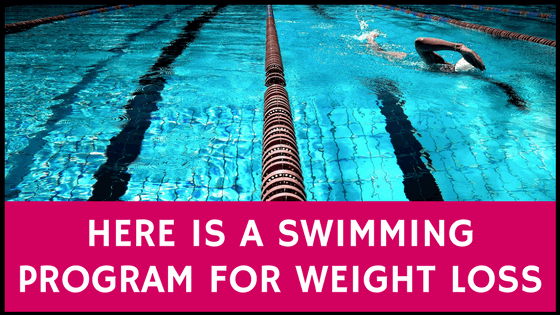
WHAT IS YOUR WEEKLY WORKOUT PROGRAM, BEING A PROFESSIONAL SWIMMER?
My weekly training program looks something like this:
Monday
- 6.30am = 4.5km aerobic swim
- 5.30pm = 4.5km high intensity swim session (endurance based)
Tuesday
- 6.30am = 4km high intensity swim session (speed based)
- Mid morning = 90 minutes weight session in gym
Wednesday
- 6.30am = 90 minute aerobic swim (4km)
- 5.30pm = 4.5km high intensity swim session (power based)
Thursday
- Mid morning = 90 minutes weight session in gym
- 2.30pm = skills and dives session including 4km swim
Friday
- 6.30am = 90 minute aerobic swim (4km)
- Afternoon = yoga and pilates session
Saturday
- 6.30am = 5km high intensity swim session (speed based)
- Mid morning = gym based core workout (90 minutes)
Sunday is a rest day, but when possible I will go surfing or play some basketball.

If you have any other swim related questions, please feel free to ask below! But I hope you enjoyed this guest blog post by Ben! You can follow Ben on Insta here :)
And as I always like to remind you guys, if you really want to lose weight without gaining it back, you should exercise and eat
Love Rachael xx
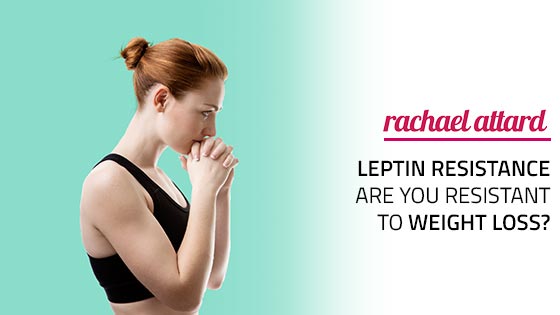

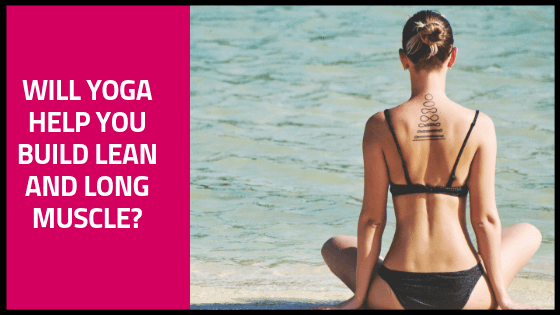




Hi Hun,
just wondering is walking in the water the same as swimming, as im not a great swimmer and hate getting my hair wet all the time so i wondered if 40 mins or so walking would increase my leg muscles ?
Thanks
Hey lovely,
Thanks for reaching out! :)
I wouldn’t say it has the same effect. Because you engage your thigh muscles heavily when walking in the water.
If swimming doesn’t work for you, you can just practice power walking on a flat surface and aim for 10 000 steps for great results. :)
If you have any further questions feel free to contact info@rachaelattard.com and we’ll gladly help! :) xx
Love,
Ana
Hi, in what way does swimming play havoc with your metabolism?
Thank you
Hi lovely, Ben is away getting ready to compete in the Commonwealth Games so I can’t ask him at the moment! I assume it’s because it increases your metabolism by such a significant amount, that when you stop swimming, your metabolism drops and you can gain weight really quickly. This happens to a lot of professional swimmers, especially women xx